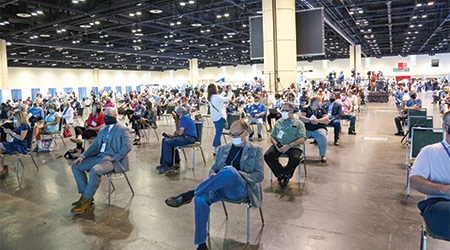
Since the OCCC had implemented most of the higher-end cleaning technology several years before COVID-19, training on exact processes hasn't undergone much change over the past year. The key difference, Clemente notes, is the importance of documenting tasks and understanding exactly why certain processes are done — a change that the GBAC partnership has helped simplify.
The implementation of checklists for cleaning staff made a significant difference for keeping everything organized. For restrooms, exhibit halls, lobbies and more, cleaning teams need to not only complete each task and check it off, but also walk through the process with their supervisor to confirm that each phase has been adequately completed.
The system not only makes sure high-touch points are accounted for, but it provides documented proof to achieve the GBAC accreditation.
"It clearly documents what they have to do and how often they need to do it. Then the supervisor will verify and sign off on tasks," says Clemente. "In the past, it wasn't as strict and simply telling the supervisor it was done would be sufficient. Nowadays, they go and check it firsthand."
The checklist is applied to product selection as well. While supply chain shortages skyrocketed the cost of face masks from $0.20 per piece to $5, and hand sanitizer from $0.15 to $5 in some cases, the center had to make sure any alternative sources met GBAC standards. On the chemical side, the OCCC had to cut several options from use because they failed to qualify for the Environmental Protection Agency's (EPA) List N.
"Over the years, we would buy products that were listed at the best price or because they came highly recommended from other facilities. Now we have to make sure several requirements are met," says Clemente. "Factors such as container or dispenser type, or EPA registration, hold a lot more importance now. It's a more thorough process, but the safety and assurance it provides makes the effort worthwhile."
Another OCCC investment was a work order system. Through the system, Clemente says any customer can either visit a service desk or send an email regarding a cleaning task that needs to be completed. Once a request is submitted, the EVS staff immediately sends workers to resolve the issue, whether it's an empty dispenser, a spill, or designated food table that hasn't been disinfected.
Although requests vary in importance, Clemente says the system is a welcome addition as it shows that the attendees are putting a greater emphasis and appreciation into keeping the facility clean.
"It's a new standard that's been established, and if they don't see something happening, I'm getting calls," he says. "We have to meet the expectations, because once you build them up, you can't scale them back down."
While social distancing protocols and masks may be temporary measures, the OCCC was able to keep its doors open at a time when many facilities shut theirs permanently. Strategic partnerships, strict protocols and a camaraderie among staff and attendees helped the OCCC resume operations in July and will continue to play an essential role in improving the way cleaning is done. That emphasis on cleaning and safety will be what attracts event exhibitors and attendees to Orlando for the foreseeable future.
Healthy Delegation
Frequencies and expectations have definitely ramped up on the cleaning side, and the center’s partnership with Orlando Health helps ensure that the EVS staff can focus all of their energy on prioritizing a safe environment for attendees. Orlando Health provides both on-site and virtual consultation services to any event attendee with questions or concerns. Health officials help provide assistance on the spot, when possible, or will direct them to the nearest hospital or healthcare-related location.
The Orlando Health partnership also provides a number of behind-the-scenes benefits to help promote both safety and the events themselves, Tester adds.
“They developed marketing materials, made consulting calls, and helped each show organizer develop a customized plan based on their unique needs. That includes the 24/7 virtual visit where anyone in town who has a question about their health can get on their phone or tablet and speak live to a health practitioner,” says Tester. “It won’t go on forever, but the partnership will last at least through 2021.”
Tips For Improving Employee Morale

 Celebrating BSCAI's 60th Anniversary eBook
Celebrating BSCAI's 60th Anniversary eBook The Down and Dirty on Cleaning in Virus Season
The Down and Dirty on Cleaning in Virus Season How Surfactant Use is Expanding in Commercial Cleaning
How Surfactant Use is Expanding in Commercial Cleaning